Terrorism
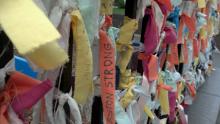
My first marathon ever — 2003 in New York City — did not go according to plan. On the positive side, I would never have guessed that P. Diddy would be running the same marathon and at the same pace for much of it, providing an entertaining entourage to distract me from my exhaustion. On the negative side, my name, which I had taped to my tank top so the crowds could give me much-needed encouragement, quickly peeled off, and I was anonymous in the crowd. My plan had been to run that last mile to the mantra “you can do anything” or “you are power,” but instead, my legs barely moving and my husband and close friend no longer by my side, I chanted dejectedly to myself: “Never again, never again.”
I didn’t know what misery associated with a marathon really was, though, until I heard about the Boston Marathon bombings, which took place one year ago today. On this day, two young brothers set off two bombs at the end of the Boston Marathon. As we waited to understand the damage, I remember thinking about the juxtaposition of the runners’ feelings of accomplishment setting in just as shrapnel began to fly. Then I received the painful — even if relieving — news that my first cousin had been right at the finish line with her husband and baby (born a year ago exactly on that marathon Monday) and had escaped the violence only because the baby needed her nap. We eventually learned that three people were dead, hundreds were injured, and the two suspected perpetrators were associated with radical Islam. I felt disgust and horror.
Moments such as this challenge each of us to live up to the “better angels of our nature,” as President Abraham Lincoln put it. As has been borne out by various terrorist attacks around the globe, terrorism breeds fear — its intended consequence. Too often this fear becomes fear of a religious group. We, as Jews, know intimately the perils of a society surrendering to this type of fear.
THE SAD RECORD of human history shows that torture has more often been the rule rather than the exception—in criminal justice systems as well as in interethnic, intercommunal, and international conflicts.
The use of torture in such situations—and brutalities that might fall short of torture but are nonetheless brutalities—can have many motivations. Torture demonstrates absolute power. Torture wreaks vengeance. Torture intimidates. Torture punishes. Torture coerces behavior change. Torture harms, and sometimes the sheer (perverted) pleasure of doing harm is enough motivation. And yes, torture is sometimes deployed to elicit information, confession, or “actionable intelligence.” (This was the main ostensible reason why the U.S. tortured after 9/11. But other factors on this list should not be overlooked.)
Torture appears to come all too naturally to fallen humanity. That is a still quite useful theological term that conveys the belief that humanity was created good by a good God but has fallen into sin and thus has suffered disastrous individual and collective damage to its character. Fallen human beings and human communities resort easily to torture.
So one way to talk about the ethics of torture and brutality is to start exactly here—with the historically and theologically grounded claim that torture has more often been the rule rather than the exception in human history, a dark but pervasive aspect of the behavior of fallen humanity. But what if we turn the discussion of torture upside down in what might be a constructive way?
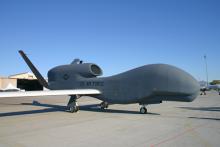
Is the U.S. scapegoating Al Qaeda? It’s an odd question, I know, but it reared its ugly head as I read about the new reports from Amnesty International and Humans Rights Watch on U.S. drone strikes. The scapegoating mechanism is a very precise instrument that accrues enormous benefits to the scapegoater. By accusing their scapegoat of wrongdoing, a scapegoater ingeniously hides from the reality of their own guilt. Now here’s the weird thing: a scapegoat does not have to be innocent to function as a scapegoat. Scapegoats can be evil, nasty, ruthless, amoral sons-of-bitches and still function perfectly well as a scapegoat. Which is why I ask the question: Is the U.S. scapegoating Al Qaeda to hide from its own guilt?
With that in mind, I invite you to read these few excerpts that raised the question for me, with key phrases in boldface:
[continued at jump]

The deadly mall attack in Kenya on Saturday is a sign that the al-Qaida-affiliated group that carried it out has been dealt a blow in Somalia and they are looking to generate headlines with more high-profile attacks in the region, a regional expert says.
The militant group that carried out the attack, al-Shabab, wants to establish an Islamist government in Somalia.
In recent years, however, African Union troops in Somalia have driven the militants out of most parts of the capital city of Mogadishu as a U.S.-supported government there has attempted to establish control over the country. At one time, al-Shabab controlled parts of Mogadishu.
The attack in Nairobi underscores al-Shabab’s organizational skills and their commitment to die for a cause, said David Shinn, a former U.S. ambassador to Ethiopia and a professor at George Washington University.
But it also highlights that the group has to rely on high-profile terrorist attacks that generate headlines because they lack popular support and have failed in any direct fights with African Union forces in Somalia.
“Increasingly, al-Shabab has alienated the average Somali,” Shinn said.
![Senator Richard Burr photo courtesy US Senate [Public domain], via Wikimedia Commons](https://sojo.net/files/styles/medium/public/blog/Richard_Burr_official_portrait_crop-295x369.jpg)
Citing the need for transparency in the U.S. record on human rights, nearly 200 clergy and religious leaders from North Carolina are seeking the public release of a 6,000-page Senate intelligence report on U.S. torture of terrorism detainees after 9/11.
The letter, dated Aug. 27 and released to the media on Thursday, was sent from the North Carolina Council of Churches in Raleigh to Sen. Richard Burr, a North Carolina Republican who sits on the Senate Select Committee on Intelligence.
The letter, signed by 18 bishops, including the leaders of both of the state’s Catholic dioceses, stated that in light of conflicts in Syria and around the Middle East, transparency on U.S. torture practices was needed.
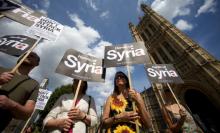
On Wednesday, President Barack Obama said that if Bashar al-Assad used chemical weapons against innocent civilians, there must be “international consequences.” The president is right. But what should those consequences be?
The issue here, again, is one that we have not decided how to deal with: terrorism. The definition of terrorism is deliberate and brutal attacks upon innocent people — whether by individuals, groups, or heads of state. By that definition, Assad is a terrorist. And terrorists who possess weapons of mass destruction and demonstrate their willingness to use them are most dangerous ones. But how should we respond?
I am in in the U.K., where political leaders last night backed off the decision to make immediate “military strikes” while the U.S. and other nations are considering them. The feeling here is that international and legal legitimacy need to be established first, that the U.N. inspectors should finish their examinations in Syria before any actions are taken, and that all other means of response should be fully explored first. These are good decisions.
Why is there such public “war fatigue” in the U.K. and the U.S. in light of Iraq and Afghanistan — and why is that creating reluctance to more military action? Because wars and military solutions have FAILED in response to terrorism — failed to achieve what they were purported to do.
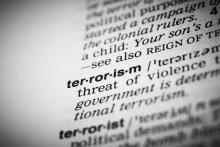
Last Saturday Muslims throughout the world celebrated Laylat ul-Qadr, usually translated in English as the Night of Power. It is part of the month of Ramadan and commemorates the night when Allah came to Muhammad with the first revelation of the Qur’an. The Night of Power is based on chapter 97 of Islam’s Holy Book. The Qur’an has 114 chapters, which are generally ordered from longest to shortest. So, chapter 97 is short enough to quote in full here:
In the name of God, the Lord of Mercy, the Giver of Mercy,
We sent it down on the Night of Power. What will explain to you what the Night of Power is? The Night of Power is better than a thousand months; on that night the angels and the Spirit descend again and again with their Lord’s permission on every task; [there is] peace that night until the break of dawn.
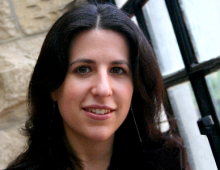
IN HER JEWISH school in Montreal, Ronit Avni learned the tragic history of her people. Her Canadian mother and Israeli father had met in the ’60s when her mother was living in Israel and working as a folk singer, often performing for Israeli troops. Her older sister was born in Tel Aviv, but the family settled back in Montreal in the mid-’70s before Ronit was born.
Not strictly religious but committed to the values of Judaism, Ronit couldn’t help but ask probing questions as she listened to the stories of the birth of the modern state of Israel in 1948. Am I hearing the whole story? How do Palestinian perspectives differ from what my educators and community leaders are teaching? How can we transform this situation from a zero-sum equation to one that respects the dignity and freedom of all?
Years later, having graduated with honors from Vassar College with a degree in political science after studying theater at a conservatory in Montreal, Ronit trained human rights advocates worldwide to produce videos as tools for public education and grassroots mobilizing.
By the time I met Ronit a few years ago, she had narrowed her worldwide focus to the Israeli-Palestinian conflict, where her heart was most deeply drawn. She is the founder and executive director of Just Vision, an organization dedicated to increasing media coverage and support for Palestinian and Israeli efforts to end the occupation and conflict without weapons of violence.
During the last several years, my engagement in the Holy Land has been significantly shaped by Ronit. Her film Encounter Point, about Israelis and Palestinians who have lost family members, land, or liberty to the conflict yet choose forgiveness and reconciliation rather than revenge, gave me hope that peace can emerge from pain.
JEREMY SCAHILL SPENT years working out his notions of social justice in homeless shelters and conflict zones and among peace activists. In 2007, Scahill’s award-winning investigative reporting made waves when he published Blackwater: The Rise of the World's Most Powerful Mercenary Army, a comprehensive exposé on the secret role of private military contractors in the United States’ “war on terror,” which prompted several congressional inquiries. Scahill’s newest book, Dirty Wars: The World is a Battlefield, digs into the obscure underbelly of U.S. covert wars.
“In one of my trips to Yemen, I traveled in the south of the country where most of the U.S. drone strikes in Yemen have happened,” Scahill said during a recent visit to Sojourners’ Washington, D.C. office. “I was interviewing a number of tribal leaders. This guy from Shabwa province said to me, ‘[Americans] consider al Qaeda [to be] terrorism. We consider your drones [to be] terrorism.’ I heard that over and over in a variety of countries. ... Many people, in Yemen or in Somalia, would not be predisposed to think of al Qaeda as anything positive. Al Qaeda is a reviled organization in Yemen. ... But there are tribal leaders who are saying, ‘You know, you pushed us into a corner where our people are now sympathetic with al Qaeda.’ After years of traveling in these countries, I really believe that we’re creating more enemies than we’re killing.”
In some respects, drones are simply a new tool of old empire. Scahill’s book title, Dirty Wars (and film of the same name), is partly “a macabre tip-of-the-hat to the dirty wars in Central America, fueled by the United States ... targeting people who are insurgents and claiming they were communists. The new version of this is targeting people who are fighting us and claiming they’re al Qaeda.”

An undisclosed community on Wednesday accepted the body of Boston bombing suspect Tamerlan Tsarnaev, which is now “entombed,” according to police in Worcester, Mass.
Tsarnaev’s uncle, Ruslan Tsarni, found a funeral home in Worcester to handle the body, but had struggled to get a cemetery to accept it. The Boston Globe reported that the body is buried in a community outside Massachusetts.
“As a result of our public appeal for help, a courageous and compassionate individual came forward to provide the assistance needed to properly bury the deceased,” read a statement posted on the Worcester Police Department’s website.

Here in the Upper Midwest (I live in Minnesota), the importance of higher ground is not just metaphorical, as snowmelt-fed flood waters rise to envelope communities. People, quite literally, are forced to higher ground by floods.
It is interesting, too, what happens when that higher ground, the literal higher ground, is sought. Necessarily, there are more people in a smaller area; that’s the nature of it. Diverse groups are forced together. We know these images from the news: the floating cars, and then the displaced people together in a school gym, talking. The power of that second image is that it shows an unexpected, shared space. People have grabbed what they could and fled to this place, often by walking uphill, and now they find themselves together.
When the metaphorical waters rise and destroy what we know or count on, people do the same thing, but that higher ground is a broad mutual faith that encompasses the belief that there is something greater than ourselves, that there must be a reason for these tragedies; we turn to God. Recently, we have seen this happen in Boston and in West, Texas. At the memorial for the victims of the explosion in West, held at Baylor University, President Barack Obama spoke openly about faith.
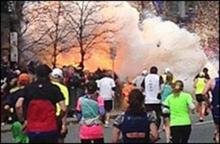
The recent explosions at the Boston Marathon and subsequent media coverage exposed yet again a dangerous trend in U.S. culture: rushing to judgment in labeling and prosecuting crimes, and throwing away long-held U.S. American ideals and legal principles of due process.
Terrorism — a form of communication and a military tactic, not an ideology — is the systematic use of violence against civilians to intimidate them for a political purpose. Too many media outlets, elected officials, and community leaders have prematurely labeled the Boston Marathon bombing an act of terrorism. Some people were upset President Obama did not label the acts "terrorism" in his address just hours after the explosions.

In the wake of the Boston Marathon bombings that left three dead and more than 260 injured, perhaps none face more significant adjustments or a longer road ahead than the 14 amputees who lost a limb.
For these victims, the path forward involves relearning almost everything, from getting out of bed to getting in a car. Whether they go on to lead satisfying lives depends largely on how they handle the spiritual challenges at hand, according to amputees and researchers.
Losing a limb is like losing a family member: It involves grief and mourning, according to Jack Richmond, a Chattanooga, Tenn., amputee who leads education efforts for the Manassas, Va.-based Amputee Coalition. When one’s body and abilities are radically changed, questions of meaning are suddenly urgent: Why did this happen? Why am I here?
“You’re wondering: Why did I live?” said Rose Bissonnette, an amputee and founder of the Lancaster, Mass.-based New England Amputee Association, a support organization for amputees.

Editor’s Note: Jim Wallis’ latest book On God’s Side: What Religion Forgets and Politics Hasn’t Learned About Serving the Common Good is sparking a national conversation on what it means to come together on issues that traditionally divide the nation. Bloggers Adam Ericksen and Tripp Hudgins are having that conversation here, on the God’s Politics blog. Follow along, and join the discussion in the comments section.
What if we surprised our enemies?
I mean, really surprised them. What if we surprised them with something totally unexpected? When our personal, political, and national enemies strike us, they expect us to strike back. That’s been the human script since the foundations of human culture. We mimic violence blow for blow. Only each side wants to be the side who delivers the final blow.
What if we surprised our enemies and changed the script?
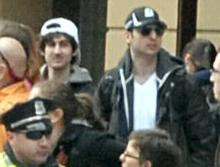
CAMBRIDGE, Mass. — After two troubling outbursts at a local mosque, leaders there told Boston Marathon bombing suspect Tamerlan Tsarnaev he would no longer be welcome if he continued disrupting services.
Leaders at the Islamic Society of Boston‘s mosque in Cambridge say Tsarnaev, 26, who died early Friday after a shootout with police, “disagreed with the moderate American-Islamic theology” of the mosque, but they never had “any hint” the brothers might be violent.
On one occasion in November at weekly prayer, Tsarnaev challenged an imam who said in his sermon that it was appropriate to celebrate U.S. national holidays, such as July 4th and Thanksgiving, the statement said.
Tsarnaev argued that such celebrations are “not allowed in the faith.” When the preacher met with Tsarnaev after the prayer, Tsarnaev “repeatedly argued his viewpoint, and then left,” the statement said.
Leading U.S. Catholic bishops on Monday denounced efforts to use the Boston Marathon bombings to derail the push for immigration reform, saying it is wrong to brand all immigrants as dangerous and that a revamped system would in fact make Americans safer.
“Opponents of immigration … will seize on anything, and when you’ve got something as vivid and as recent as the tragedy in Boston it puts another arrow in their quiver,” New York Cardinal Timothy Dolan, president of the U.S. Conference of Catholic Bishops, told reporters.
“To label a whole group of people – namely, the vast population of hard-working, reliable, virtuous immigrants – to label them, to demean them because of the vicious, tragic actions of two people is just ridiculous,” he said. “Illogical. Unfair. Unjust.”

I’m not offering this as consolation to those who have lost someone they love, but as a warning. What’s true of those we love may be just as true of those whom we hate and fear: we become like what we worship, and we worship what we cherish in our hearts.
When people commit monstrous deeds, it is hard not to turn and stare in horror. Think about how hard it is to pull your eyes from the television even when none of the news is new, just the same breathless commentary about what we don’t yet know, what we still don’t understand about the latest act of terror.
When the monsters and their violence become our focus, they grow and become our gods. We’ve become very good at hurting one another, so of course we need to be vigilant. But it’s possible to take our fear too far, to let our natural reaction to sudden violence become a permanent policy of suspicion and terror. Then we are in danger of worshiping our would-be enemies. We don’t worship them joyfully, but we worship them anyway, the way we might worship any vengeful, unstable, wrathful gods: looking over our shoulders and fearing their power. If the best we can come up with is invective against immigrants, suspicion of people unlike us, and perpetually heightened security measures, it starts to look like our hearts are full of fear.
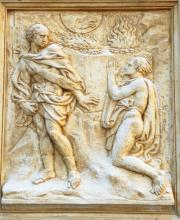
It’s one of the deepest and most enduring themes of the Bible; from Cain and Abel, Isaac and Ishmael, Esau and Jacob, and many more — the two sons, with jealousy, strife, and even murder between them, and almost always, the younger brother takes the glory – or the blame – for the acts of the older brother.
We see it again in the Boston Marathon bombings – the elder brother portrayed as cynical and brutish, while the younger brother, taking the blame, is shown as charming and innocent.
American Muslim leaders said they stand against terrorism committed in the name of Islam, trying to distance themselves from the suspects in the Boston Marathon bombings who were identified as Muslims with ties to Chechnya.
“We will never allow ourselves to be hijacked by this attempt, and we will not allow the perception to be that there is any religion in the world that condones the taking of innocent life,” said Nihad Awad, national executive director of the Council on American-Islamic Relations.
As the manhunt intensified in and around Boston, Muslim leaders convened a press conference Friday to denounce the attacks and to urge the media not to link their faith with violent extremism.
President Barack Obama praised Bostonians for their actions “in the face of evil” during an interfaith memorial service on Thursday for victims of the Boston Marathon bombing.
“You’ve shown us, Boston, that in the face of evil, Americans will lift up what’s good. In the face of cruelty, we will choose compassion,” Obama said.
The 90-minute service at the Cathedral of the Holy Cross featured local political figures and religious leaders from Christian, Jewish and Islamic traditions. Boston Cardinal Sean O’Malley shared a greeting with the congregants from Pope Francis.
“The Holy Father invokes God’s peace upon our dead, consolation upon the suffering and God’s strength upon all those engaged in the continuing work of relief and response,” O’Malley said.
Obama opened his remarks with Scripture, and quoted it throughout his speech.